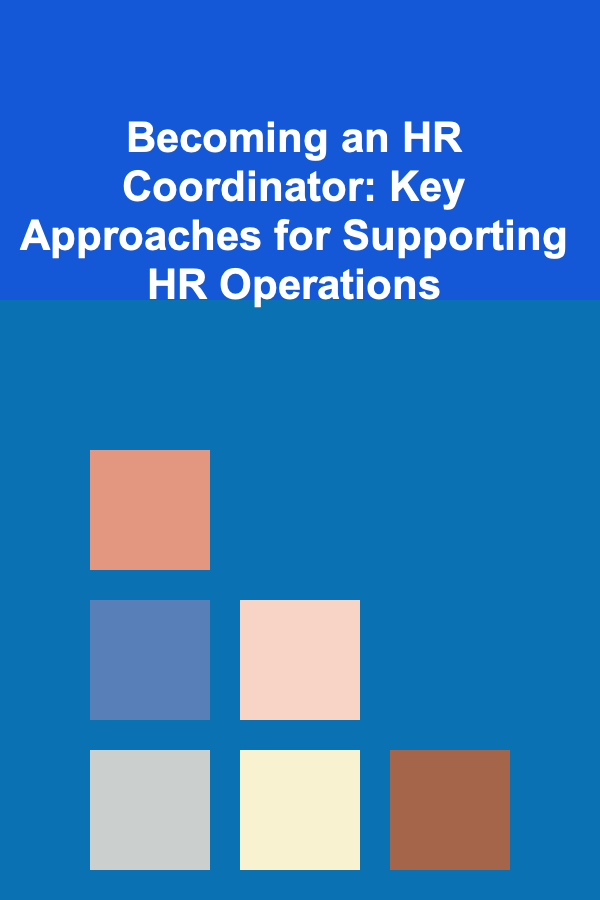
Becoming an HR Coordinator: Key Approaches for Supporting HR Operations
ebook include PDF & Audio bundle (Micro Guide)
$12.99$6.99
Limited Time Offer! Order within the next:

The role of a Human Resources (HR) Coordinator is integral to the smooth functioning of any organization. As the link between employees and the management, HR Coordinators are responsible for assisting in various HR operations, ensuring that all HR processes are efficient, streamlined, and comply with relevant policies and regulations. While the role may vary slightly depending on the size and type of organization, there are key strategies and actionable approaches that an aspiring HR Coordinator can adopt to support HR operations effectively.
This guide outlines the core responsibilities of an HR Coordinator, key skills required, and practical steps for excelling in the role.
Understanding the Role of an HR Coordinator
An HR Coordinator plays a vital role in managing and executing HR processes, such as recruitment, onboarding, employee relations, performance management, and compliance. Typically, an HR Coordinator works under the direction of an HR Manager or Director and collaborates with other departments to ensure that HR policies and practices are adhered to across the organization.
Key Responsibilities
- Recruitment and Onboarding: Assisting in the hiring process by posting job openings, scheduling interviews, communicating with candidates, and facilitating the onboarding process.
- Employee Records and Documentation: Maintaining employee files, including personal data, employment contracts, performance evaluations, and other relevant documents.
- Benefits Administration: Assisting employees with benefits inquiries, processing benefits enrollments, and coordinating benefits programs.
- Payroll Support: Working with payroll teams to ensure timely and accurate processing of payroll.
- Training and Development: Organizing training sessions, workshops, and continuing education programs for employees.
- Compliance and Reporting: Ensuring that the company adheres to labor laws and regulations, maintaining compliance with HR reporting requirements.
- Employee Relations: Addressing employee concerns, assisting with conflict resolution, and supporting employee engagement initiatives.
In essence, the HR Coordinator is the backbone of an organization's HR function, handling a variety of tasks that ensure employees are well-supported and HR operations run smoothly.
Core Skills for an HR Coordinator
Being an effective HR Coordinator requires a unique set of skills that go beyond administrative tasks. HR Coordinators must be adept in both technical HR knowledge and interpersonal abilities. Below are some of the most crucial skills needed to thrive in this role:
1. Organizational and Time Management Skills
HR Coordinators juggle multiple tasks at once, from managing employee records to supporting recruitment efforts. The ability to prioritize tasks, stay organized, and meet deadlines is essential for success. Time management tools, such as task lists, project management software, and time-tracking applications, can help streamline day-to-day operations.
2. Communication and Interpersonal Skills
As an HR Coordinator, communication is a key skill. Whether you are writing emails, conducting interviews, explaining policies, or handling employee concerns, clear and empathetic communication is critical. The role requires a balance of assertiveness and diplomacy, particularly when dealing with sensitive employee issues.
3. Knowledge of HR Software and Tools
HR Coordinators work with various HR tools and software systems, including Human Resource Information Systems (HRIS), applicant tracking systems (ATS), payroll software, and benefits administration platforms. Familiarity with these tools can greatly increase efficiency and accuracy in HR operations.
4. Attention to Detail
HR work involves managing sensitive and confidential information, such as employee records, contracts, and payroll data. An HR Coordinator must pay close attention to detail, ensuring that all documents are complete, accurate, and up to date.
5. Problem-Solving Skills
HR Coordinators often face issues ranging from administrative hurdles to employee concerns. Being able to assess a situation, think critically, and find solutions is a valuable skill in resolving conflicts or improving HR processes.
6. Knowledge of Employment Laws and Regulations
An understanding of labor laws, employee rights, and compliance regulations is essential for an HR Coordinator. This knowledge ensures that HR practices are compliant with federal, state, and local regulations, avoiding potential legal pitfalls.
Key Approaches to Supporting HR Operations
An HR Coordinator's ability to contribute effectively to HR operations depends on adopting a proactive approach to various HR processes. Below are actionable steps and strategies for excelling in the role and supporting HR operations:
1. Streamlining Recruitment and Onboarding
Recruitment and onboarding are foundational elements of HR operations. HR Coordinators can enhance these processes by adopting the following strategies:
- Develop Clear Job Descriptions: Ensure that job descriptions are well-written, up to date, and aligned with organizational needs. A detailed job description helps attract the right candidates and streamlines the recruitment process.
- Use an Applicant Tracking System (ATS): Implementing or optimizing an ATS helps to track candidates, manage resumes, schedule interviews, and communicate with applicants in an organized manner. This tool is essential for handling large volumes of applications efficiently.
- Enhance the Onboarding Experience: The onboarding process should make new hires feel welcomed and integrated into the organization. Create an onboarding checklist, set up orientation sessions, and ensure new hires receive the necessary resources (IT equipment, benefits enrollment forms, etc.) early in the process.
- Create Onboarding Documentation: Develop standardized documents such as welcome guides, handbooks, and HR policies for new hires. These documents help employees better understand their role, the company culture, and their benefits.
2. Efficient Employee Record Management
A large part of an HR Coordinator's role is maintaining employee records. The following practices will help streamline record-keeping:
- Go Digital: Use an HRIS or document management software to store employee records electronically. This makes it easier to update, retrieve, and secure important data.
- Maintain Compliance: Keep track of important employment documents such as contracts, performance reviews, disciplinary actions, and tax forms. Make sure that all records comply with privacy laws and regulations like GDPR or HIPAA.
- Implement a Structured Filing System: Ensure that all records are organized in a systematic manner---by employee name, department, or role---so they are easy to locate when needed.
3. Supporting Payroll and Benefits Administration
HR Coordinators play a vital role in supporting payroll and benefits functions. Here are key approaches to improve efficiency in this area:
- Stay Updated on Payroll Systems: Keep up-to-date with payroll software, ensuring that all necessary data (employee hours, salaries, and deductions) is accurately input and processed. Regularly check for updates to tax regulations or payroll policies.
- Assist with Benefits Enrollment: Help employees understand their benefits options and assist them with enrollments or changes to their benefits plans. Regular communication about benefits (health insurance, retirement plans, etc.) is key to ensuring employees are aware of available options.
- Keep Benefits Data Accurate: Maintain up-to-date records of employee benefits elections and make sure all required paperwork is filed on time to prevent errors in benefits administration.
4. Fostering Employee Engagement and Relations
An HR Coordinator should be proactive in creating an engaging work environment and addressing employee concerns. Here's how to do it effectively:
- Establish Open Communication Channels: Encourage employees to share concerns and ideas through anonymous surveys, open-door policies, or regular one-on-one check-ins with managers. Ensuring employees feel heard can help improve morale and productivity.
- Support Conflict Resolution: Provide mediation and conflict resolution support when necessary. By acting as a neutral third party, HR Coordinators can help resolve workplace conflicts in a fair and timely manner.
- Plan Employee Engagement Initiatives: Organize activities such as team-building events, recognition programs, and wellness initiatives that foster a positive work environment and increase employee engagement.
5. Ensuring Compliance and Reporting
Compliance is a critical aspect of HR operations. HR Coordinators must stay on top of compliance regulations and ensure that the company adheres to them.
- Regularly Review Labor Laws: HR Coordinators should be aware of both local and federal labor laws that affect employment practices, including wage laws, safety regulations, and discrimination policies.
- Maintain HR Reports: Regularly update and review HR reports related to hiring, terminations, promotions, and employee performance. These reports should be submitted to management and used to evaluate organizational trends and HR effectiveness.
Conclusion
Becoming an HR Coordinator is a rewarding career path for those who thrive in dynamic, people-focused environments. By adopting a strategic approach to supporting HR operations, HR Coordinators can significantly enhance the efficiency and effectiveness of HR processes in any organization. Key to success in this role are organizational skills, knowledge of HR tools, communication abilities, and a deep understanding of compliance regulations.
For aspiring HR professionals, honing these skills and adopting a proactive mindset will not only help streamline HR functions but also build a more positive and efficient workplace environment, ultimately contributing to the success of the organization.

How to Balance Short-Term and Long-Term Goals Effectively
Read More
How to Create a DIY Photo Booth for Your Party
Read More
How to Make a Holiday Garland for Your Staircase
Read More
How to Master Cobblers and Crisps
Read More
The Operations Manager's Playbook: Strategies for Optimizing Performance and Growth
Read More
Top Tips for Utilizing Loyalty Programs for Grocery Shopping Like a Pro
Read MoreOther Products

How to Balance Short-Term and Long-Term Goals Effectively
Read More
How to Create a DIY Photo Booth for Your Party
Read More
How to Make a Holiday Garland for Your Staircase
Read More
How to Master Cobblers and Crisps
Read More
The Operations Manager's Playbook: Strategies for Optimizing Performance and Growth
Read More